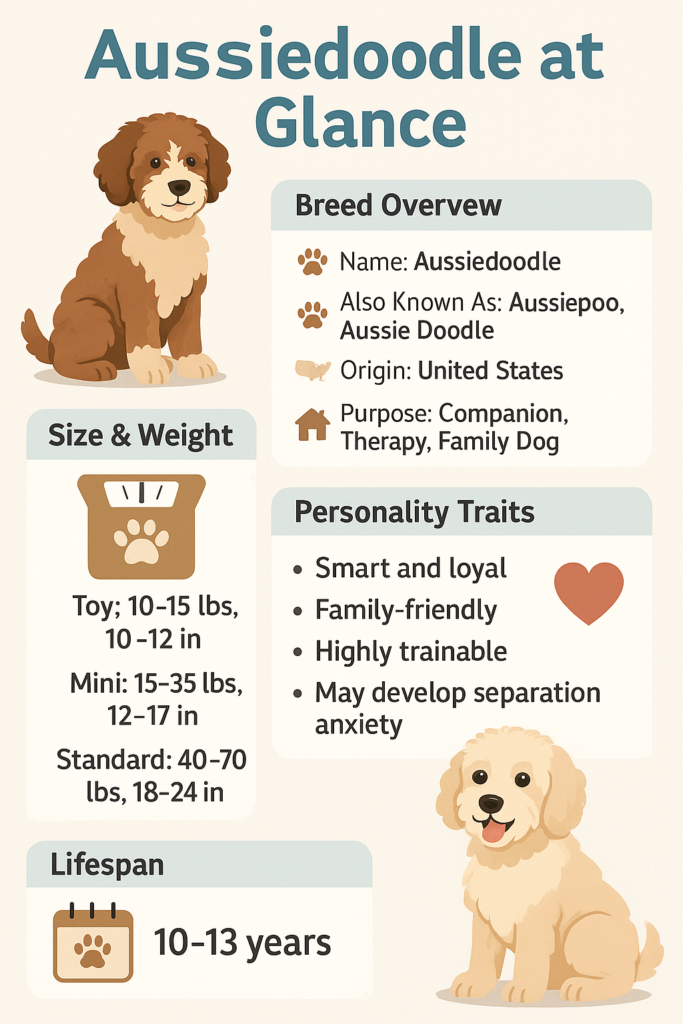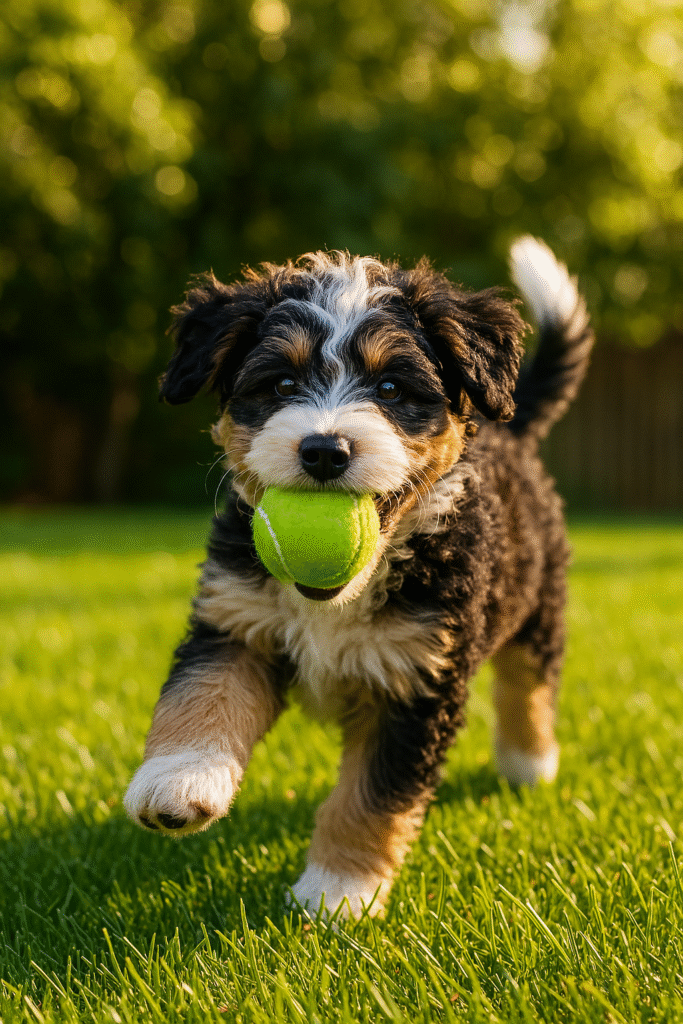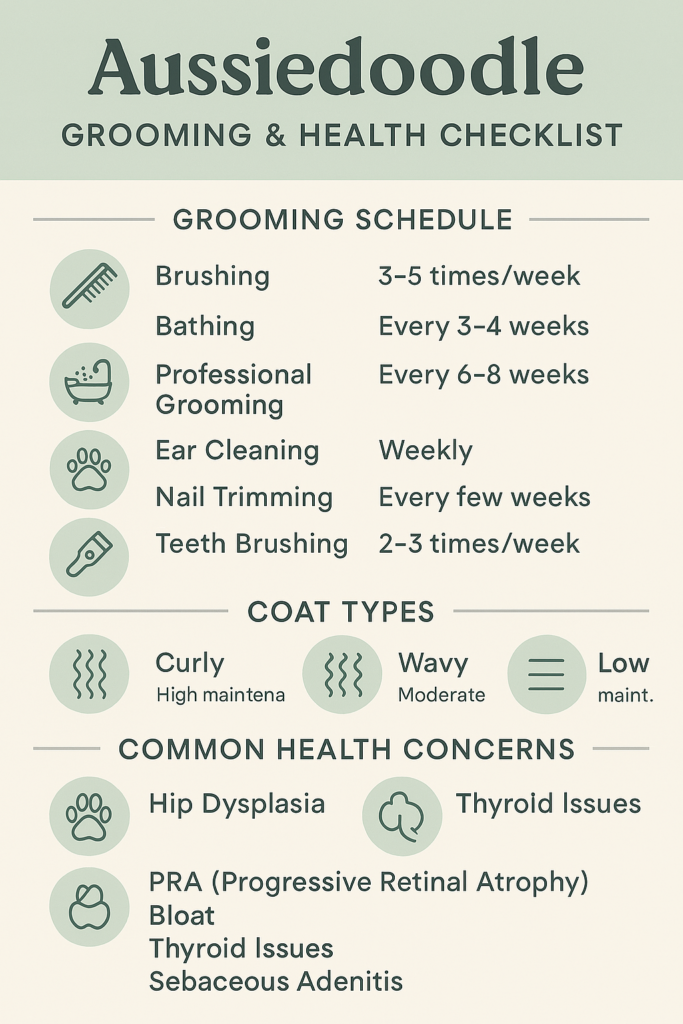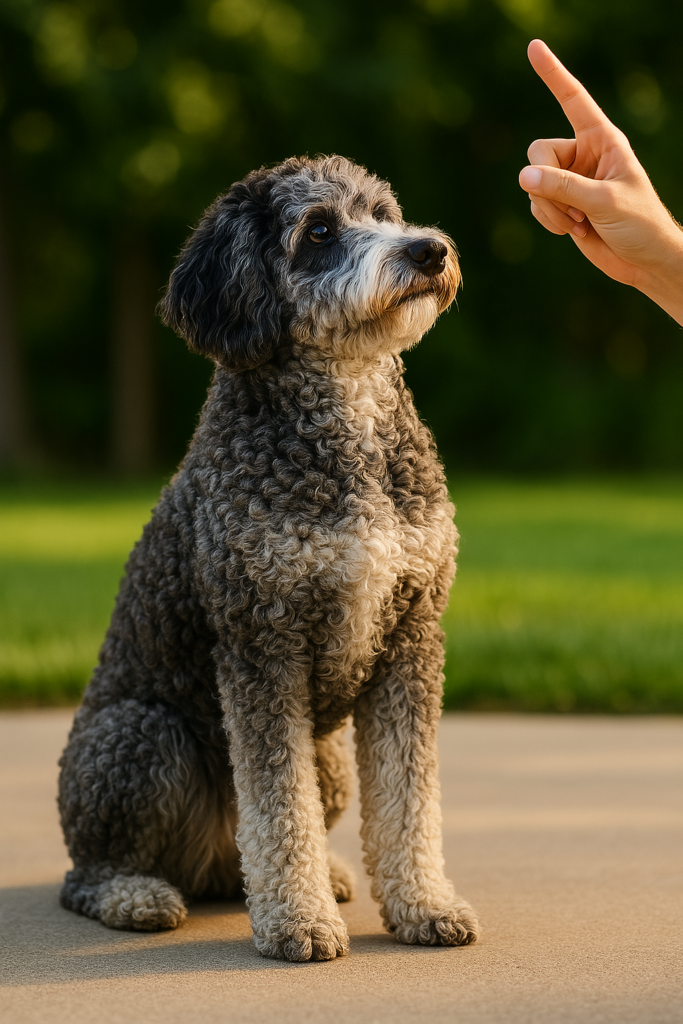Are you considering adding a furry companion to your family? If yes, you’re not alone. I’m going to explore a beloved designer breed: the Aussiedoodle. Indeed, this delightful mix of the energetic Australian Shepherd and the clever Poodle is winning hearts everywhere.
With their fluffy coats, playful energy, and remarkable intelligence, these are smart, trainable, and irresistibly lovable. Whether you want a cuddle buddy, a jogging partner, or a family-friendly furball, this breed might just be your perfect match.
Before picking your perfect pup, take a few minutes to explore this guide. From size and temperament to grooming tips and health care, I’ve gathered everything you need to know to decide.
What Is An Aussiedoodle?
This charming mix of Poodle and Australian Shepherd makes the Aussiedoodle a brainy, loving designer dog. However, although not recognized as a purebred by major kennel clubs like the AKC, yet it has gained popularity as a loving, energetic, and smart companion.
Quick Breed Facts
- Other Names: Aussiepoo, Aussie Doodle
- Origin: United States
- Purpose: Companion, therapy, and family dog
This crossbreed combines intelligence, good looks, and high energy in one place.
Aussiedoodle Appearance & Sizes

It has different types based on the appearance of their Poodle parent.
| Type | Weight | Height |
| Toy Aussiedoodle | 10–15 lbs | 10–12 inches |
| Mini Aussiedoodle | 15–35 lbs | 12–17 inches |
| Standard | 40–70 lbs | 18–24 inches |
Mini Aussiedoodle Size Insight
The mini aussiedoodle size makes it a popular option due to its ideal balance of compactness and energy, perfect for smaller homes. These dogs typically weigh between 15–35 pounds and are good for apartments or small homes.
Coat & Color Variations
Aussiedoodles have curly, wavy, or straight coats and come in merle, chocolate, tan, cream, black, and parti-color. Because they shed very little, they are often a preferred option for people who have mild allergies.
Aussiedoodle Temperament & Personality Traits
In fact, Aussiedoodles are a playful and intelligent breed. It loves attention and interaction. Their temperament is generally friendly, loyal, and affectionate, making them excellent family pets. Their high trainability and loyalty make them excellent companions for kids and other animals. These dogs love to learn and stay engaged, but they may become anxious if left alone for too long.

Aussiedoodle Care & Maintenance
They are energetic and require consistent care to stay healthy and happy. Daily exercise of at least 60 to 90 minutes is necessary for them. They particularly enjoy activities like hiking, agility, fetch, and swimming. In addition to physical activity, it’s important to provide them mental challenges like puzzle toys, obedience lessons, and trick trainings to prevent boredom and unwanted behavior.
Aussiedoodle Feeding & Nutrition Guidelines
A balanced diet is essential to meet their growth and energy needs. The amount of food varies with size.
- Toy Aussiedoodle: 1–1.5 cups per day
- Mini Aussiedoodle:5–2.5 cups per day
- Standard Aussiedoodle:5–4 cups per day
Feeding Tips
- Opt for high-protein, quality dog food
- Avoid fillers and artificial colors
- Ask your vet for a feeding plan
Aussiedoodle Grooming Needs & Hygiene
Grooming your Aussiedoodle is not just about appearance, but it’s about health and bonding. Because of their Poodle heritage, Aussiedoodles tend to have curly or wavy hair that can mat easily if not maintained.
Grooming Frequency
- Brushing: Brush 3–5 times per week to prevent matting and tangles. For curlier coats, consider daily brushing.
- Bathing: Bathe every 3–4 weeks, or when your dog gets especially dirty. Use a gentle, dog-safe shampoo.
- Professional Grooming: Schedule every 6–8 weeks, especially if you prefer a teddy bear or puppy cut.
- Ear Cleaning: Examine and clean ears each week to avoid infections and wax.
- Nail Trimming: Trim nails every few weeks or when you hear them tapping.
- Dental Hygiene: Use dog-safe toothpaste to brush teeth 2–3 times weekly.
Grooming Your Aussiedoodle: Tips by Coat Type
- Curly Coat (more like a Poodle): Requires regular trims and detangling sprays.
- Wavy Coat: Easier to manage but still needs consistent brushing.
- Straight Coat (rare): Least maintenance but can still mat behind ears and legs.
Warning: If mats form behind the ears or under the arms, do not pull them. Use a dematting tool or visit a groomer.

Health Issues to Know
While generally healthy, Aussiedoodle health issues include:
- Hip Dysplasia
- Progressive Retinal Atrophy (PRA)
- Bloat
- Thyroid Disease
- Sebaceous Adenitis
Aussiedoodle Lifespan & Health Overview
With proper care, the aussiedoodle lifespan typically ranges from 10–13 years. Regular vet visits, a balanced diet, and exercise play key roles in ensuring a long, healthy life.
Training & Socialization Tips for Your Aussiedoodle
Consequently, Aussiedoodles are incredibly smart and eager to learn, making them a dream to train—especially for first-time dog owners. Their Poodle lineage contributes high intelligence, while the Australian Shepherd side adds a strong work ethic and a desire to please. This combination makes early training both rewarding and essential.

Aussiedoodle Training Tips for All Ages
- Start Early: Begin training as early as 8 weeks. This is the ideal window when your pup is most impressionable.
- Positive Reinforcement: Use treats, praise, toys, or playtime as rewards for good behavior. Avoid punishment—it can cause confusion or anxiety.
- Short Sessions: Keep sessions to 5–10 minutes for puppies to maintain focus twice a day.
- Be consistent: Stick to consistent command words like “sit,” “stay,” and “come.” All family members should use the same cues.
- Clicker Training: Aussiedoodles respond well to clicker training, which pairs a sound with a reward to reinforce desired behavior.
Socialization Strategies
Early and diverse socialization is crucial for shaping a well-rounded dog. They might act shy or reserved with strangers if not socialized early.
- Introduce New Experiences: Gradually expose your pup to loud sounds (vacuum, thunder), different floor textures, cars, and various settings like parks or markets.
- People & Pets: Let them meet friendly dogs, children, elderly individuals, and other pets under controlled, positive conditions.
- Enroll in Puppy Classes: These group classes are great for building basic obedience, confidence, and social skills. Look for trainers that use force-free methods.
Trainer’s Tip: Finish each session positively to keep your pup excited for more.
Is the Aussiedoodle the Right Breed for You?
Picking a dog breed isn’t just about appearance—it’s about compatibility. Aussiedoodles are charming, intelligent, and deeply affectionate dogs, but they’re not the right fit for every household. Here’s a closer look at what makes them a great match—and when you might want to consider a different breed.

You’re a Great Match For An Aussiedoodle If:
- You lead an active lifestyle: Aussiedoodles thrive with owners who enjoy hiking, jogging, or long walks. If you’re outdoorsy or love spending time playing fetch in the yard, this breed will be in heaven.
- You want a family-friendly dog: Their gentle nature, playfulness, and patience make Aussiedoodles a top choice for families with kids. Early socialization helps them become friendly with other animals.
- You have time for training and engagement: Aussiedoodles are highly intelligent and crave mental stimulation. Whether it’s obedience classes, agility training, or puzzle toys, they want to stay mentally busy.
- You don’t mind regular grooming: Regular grooming keeps their coats looking beautiful. If you enjoy grooming or are comfortable scheduling regular grooming appointments, it’s manageable.
- You’re looking for a loving companion: Aussiedoodles form strong bonds with their humans and love to be part of the family. They’re often described as “velcro dogs” who want to be involved in everything.
If you want a dog that’s playful yet obedient, energetic yet cuddly, and smart but affectionate—an Aussiedoodle checks all those boxes.
An Aussiedoodle May Not Be Ideal If:
- You prefer a low-energy or low-maintenance breed: Aussiedoodles have a lot of energy and need both physical and mental outlets. If your idea of a dog is one that lounges all day, this breed might be overwhelming.
- You’re away from home for long periods: These dogs are social and do not do well when left alone for extended hours. Separation anxiety can become a problem, causing excessive barking and chewing.
- You’re looking for a hypoallergenic dog guaranteed: While Aussiedoodles are often labeled hypoallergenic, no dog is truly allergy-proof. They are lower-shedding than many breeds, but allergy sufferers should spend time with one before committing.
- You don’t have time for grooming: Their coat can easily mat without regular maintenance. If you’re not up for frequent brushing or trips to the groomer, this could lead to discomfort or skin issues for your dog.
Consider These Questions Before Adopting
- Can I provide 1–2 hours of daily activity and playtime?
- Do I have time for regular grooming and brushing?
- Am I willing to invest in training, especially during the first year?
- Will my schedule allow me to be present for my dog most of the day?
- Do I want a loyal, affectionate dog that follows me everywhere?
Ideal Owners for the Aussiedoodle Breed
As I see, the Aussiedoodle is an ideal companion for active individuals and families who have the time, energy, and love to give. If you’re ready to commit to a dog that’s smart, affectionate, and full of personality, the Aussiedoodle might just be your perfect furry friend.
Aussiedoodle FAQs
Q: Are Aussiedoodles good with kids and other pets?
A: Yes, they are affectionate and gentle with children. Their playful nature makes them ideal for families. With early socialization, they also get along well with other pets, including cats and dogs.
Q: Are Aussiedoodles good apartment dogs?
A: Yes—especially miniature Aussiedoodles and toy Aussiedoodles. Their size and temperament can work well in apartments, provided they receive daily exercise and mental stimulation. Standard Aussiedoodles may require more space.
Q: How much exercise does an Aussiedoodle need?
A: They need at least 60 to 90 minutes of active exercise per day. This can include fetch, hikes, agility training, or long walks. Without adequate activity, they can become bored and destructive.
Q: Are Aussiedoodles easy to train?
A: Absolutely. Aussiedoodles inherit intelligence from both parents, making them quick learners. With consistent positive reinforcement training, they pick up commands, tricks, and routines very fast.
Q: Do Aussiedoodles shed, and are they hypoallergenic?
A: They are generally low shedders, especially those with curlier coats. While not 100% hypoallergenic, they’re a good option for people with mild allergies.
Q: How much does an Aussiedoodle cost?
A: The aussiedoodle price varies widely based on size, breeder reputation, and coat color, ranging from $1,000 to $3,500 for a healthy, well-bred Aussiedoodle puppy.
Q: Can Aussiedoodles be left alone?
A: Not for extended periods. They are social dogs and may develop separation anxiety. If you work long hours, consider hiring a dog walker or enrolling them in doggy daycare.
Q: Do Aussiedoodles bark a lot?
A: Aussiedoodles are moderately vocal. They may bark to alert, play, or express anxiety. Early socialization and proper training can help manage excessive barking behavior.
Q: How long do Aussiedoodles live?
A: The aussiedoodle lifespan typically ranges from 10–13 years. Proper diet, exercise, and vet care can contribute to a longer, healthier life.
Q: Are Aussiedoodles easy to potty train?
A: Yes, with consistency and reward-based training, most Aussiedoodles are quick to learn house training. Crate training is especially helpful during this stage of raising your puppy to ensure consistency and routine.
Final Thoughts on Raising an Aussiedoodle
With their blend of intelligence, affection, and energy, Aussiedoodles have quickly become one of America’s favorite hybrid dogs. Their best growth happens in environments that nurture their physical and emotional health. In conclusion, If you’re ready to commit to an engaging and lovable companion, the Aussiedoodle might just be the perfect fit for you.
Personal Perspective
From my experience and research, Aussiedoodles stand out not just because of their adorable looks but their incredible adaptability and personality. They truly flourish when you dedicate time to early training and socialization. Their affectionate nature makes them wonderful family dogs, especially in homes that offer plenty of exercise and mental enrichment. However, I also think it’s crucial for potential owners to be realistic about the grooming needs and the social attention these pups require. They aren’t the best fit for very busy or low-energy homes, but for those willing to engage, an Aussiedoodle can become a loyal, joyful member of the family who brightens every day.
